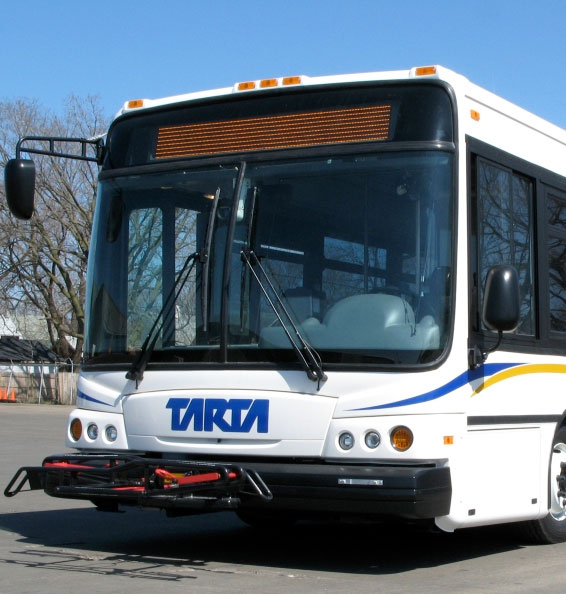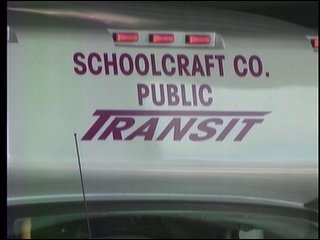Yesterday was a relatively quiet election day for transportation-related ballot measures, but of the six transit initiatives that came before voters yesterday, five six passed, with a sixth seventh too close to call. That’s in line with last year’s 79 percent success rate -- 71 percent since 2000. When asked, voters overwhelmingly choose to raise their own taxes to improve public transportation.

There were no high-profile campaigns this year in major metropolitan areas, but that doesn't mean this year's ballot contests aren't worthy of note. “I see a statement about the viability of both transit and these campaigns in smaller regions and rural places,” said Jason Jordan, director of the Center for Transportation Excellence.
Ohio: Let’s start with the most unsettling news: Residents of Spencer Township, Ohio, were asked whether they wanted to secede from the Toledo area’s transit agency, TARTA. It’s the exact same question they were asked last year, when they voted 59 percent to 41 percent to stay in.
Yesterday, however, was a different story. With low voter participation on an off-year, the secession referendum appears to have won by the narrowest of margins -- “by 16 votes out of 520 cast, according to preliminary results” reported by the Toledo Blade last night.
Spencer Township isn’t the only Toledo-area jurisdiction to question its participation in TARTA. It's been happening in outlying areas on the fringe of the regional system, Jordan said, where residents might feel they’re not getting much service and want to start their own transit agency, focused on their community. That’s what happened in Perrysburg.
In March 2012, Perrysburg voters opted to leave TARTA in favor of starting a new local system -- but then in November of that year, they voted narrowly to defeat the property tax proposal to fund that new system. Caught in a bind, they passed a funding measure earlier this year, but at about half the level originally proposed, making possible only dial-a-ride and fixed route service for people with disabilities.
Nearby Sylvania Township considered secession as well, but without a plan to create local service. That measure failed resoundingly last November, 37 to 63, and Sylvania Township remains part of TARTA.
A recount could still be necessary for Spencer Township, given the closeness of the vote.
Either way, let’s not let this blow to regional transit darken our view of what was a very successful night for transit.
Washington: In Okanogan County, Washington, voters approved a 0.4 percent sales tax to create a brand-new countywide transit authority to provide bus service. And in Grays Harbor County on the other side of the state, a 0.1 percent sales tax increase was approved 71 to 29 percent. That increase will restore weekend service that was cut earlier this year due to lack of funds.
Montana: The Mountain Line transit agency in Missoula, Montana, went back to voters for the first time since it was established 35 years ago. Voters responded with a 57-43 vote in favor of a property tax hike that will increase bus frequency, extend evening service on high-use routes, and increase van service for seniors and the disabled. The business community and newspapers got behind this measure in a big way, propelling it to victory.

Michigan: Meanwhile, Schoolcraft County in Michigan’s Upper Peninsula voted 68-32 in favor of a property tax increase to fund expanded transit services. Michigan tends to have a lot of transit-related ballot measures because they give them each a short timeframe. This, for example, is just a five-year tax, meaning Schoolcraft County will have to go back to voters in 2018 to extend.
Maine: A statewide ballot measure in Maine to issue $100 million in bonds for a large number of transportation projects succeeded with 72 percent of the vote. It’s not exclusively transit by a long shot, but CFTE found the transit element sufficient to score it.
Notably, Maine’s Tea Party-affiliated Governor Paul LePage had been very resistant to this and four other bonds being proposed, skeptical as he is about debt financing. But he did come around eventually, supporting the transportation measure -- which ended up winning by a larger margin than the others on the ballot, despite the fact that it was asking for far more money than the rest.
Another bond measure, this one in Mesa, Arizona, passed but wasn’t scored by CFTE because hardly any of the $79 million it will raise will go to transit. Some, however, will fund pedestrian improvements and multi-use paths and trails.
2014: Florida, North Carolina, Colorado, and Los Angeles?
With 2013’s transportation votes behind us, we can look ahead to next year, which could help settle some long-brewing angst in various places that have been on the fence for years about funding transit. Two counties in the Tampa Bay area -- Polk and Pinellas -- have committed to going to the ballot in 2014. This follows a high-profile loss in 2010, when Tampa’s Hillsborough County voted down a one-sent sales tax, 75 percent of which would have gone to new bus lines and a new light rail system. Tampa’s business community is still trying to figure out how to get past that stinging defeat.
Polk County, to the east of Tampa, and Pinellas to the west wouldn’t be able to build much of a transit system without the participation of Hillsborough, which sits between the two and includes the city of Tampa itself. So their vote, more than anything, will build the momentum for Hillsborough County to eventually change its mind.
Tampa is one of the biggest cities in the country that doesn’t have a rail transit system. Tampa’s streetcar network has seen such anemic ridership that it’s strengthened the hand of transit opponents.
Similarly, the North Carolina triangle’s Orange County and Durham County have already approved ballot initiatives to fund a new light rail system, but Raleigh’s Wake County has been skittish. 2014 could be the year to get it done.
Colorado is considering a statewide tax package for transportation as early as next year, which would be a big win for transit in Denver and a host of rural communities. However, a big statewide school financing measure failed in the state last night, leading some to question to viability of a similar move for transportation funding. Missouri may also move forward with a statewide transportation measure, Jordan said.
And Los Angeles may go back and try to right last year’s wrongs, when they failed to pass Measure J, an extension of the Measure R transit tax. “It won’t be longer in terms of duration but it might go up,” Jordan said. He said Los Angeles advocates had thought that extending the tax, rather than raising it, would be a selling point -- but since people saw it as a tax increase anyway, they may as well just increase the tax. Jordan says they may also try to chip away at the supermajority requirement -- after all, Measure J won 66 percent of the vote, but not the 66.67 percent needed to pass.
And Jordan notes that the disappointing mayoral election of a streetcar opponent in Cincinnati could foretell a 2014 ballot measure, if the City Council doesn’t want to axe the project on their own.
UPDATE 3:29 p.m.: From Jason Jordan: "There's a late addition to our list of initiatives. Lake County, Ohio passed a measure to lock in a dedicated portion of its sales tax for transit. It isn't new revenue per se but it is pro-transit. So, that amends our totals to 9 wins in 2013 (6 on Election Day) for an approval rate in 2013 of 69.2%. Sorry for the late information. Since it wasn't new revenue, it escaped our attention until now."
UPDATE 11/7/13, 4:16 p.m.: A reader let us know about another transit victory from Tuesday: The town of Nederland, Colorado, about 15 miles west of Boulder, voted to extend their free transit pass program. The town started participating in Boulder's EcoPass program 18 months ago and, according to supporters, have reduced carbon emissions by 90.3 metric tons, and vehicle miles driven in Boulder Canyon by 250,000 miles, during that time.





